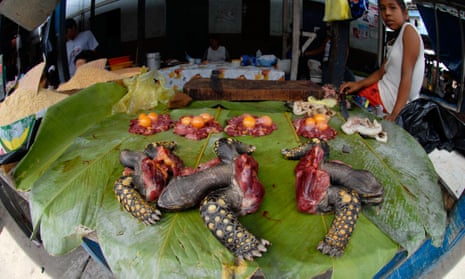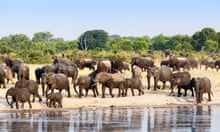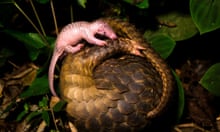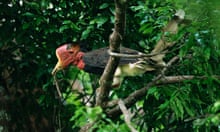Where a confluence of rivers meet the Peruvian city of Iquitos, the world’s largest city to be inaccessible by road, lies Belén, a partially floating shanty town and market where endangered monkeys change hands for a few dollars and wildlife traffickers take orders to stock informal zoos or private collections with the abundant fauna from the world’s largest rainforest.
Wildlife is part of the town’s daily trade. A ban on selling bushmeat is openly ignored in Belén’s market. Deep-auburn slabs of the smoked meat of the endangered South America tapir (Tapirus terrestris) are stacked high on trestle tables. The protruding hoof of a peccary or the paw of an agouti betray the fact that there is hunted game on sale.
A yellow-footed tortoise (Chelonoid denticulata), listed as vulnerable by the IUCN red list, is butchered for the pot while still quivering, its head moves from side to side. The woman cutting up its front-parts remarks: “This animal dies when it’s in the pot.” Biodiversity served up in all its gory detail. The soft-shelled eggs of the taricaya, an Amazon river turtle (Podocnemis unifilis), also listed as vulnerable, are served in pungent heaps to customers in the rubbish-strewn alleys.
Indigenous communities are allowed to hunt and eat wild game but selling the meat is prohibited. But old habits die hard, says Clelia Rengifo, the head of wildlife trafficking control for the regional government of Loreto, Peru’s largest Amazon region which occupies one-third of the country, an area bigger than Germany.
Peru’s environmental police rarely seize bushmeat in Belén, because, she says, it is too dangerous. “Before you know it the people start to gather and there’s a machete flying, a shot fired or a knife appears. It’s overwhelming.”
The illicit trade in endangered species – dead or alive – and how to stop it will be discussed at the 17th meeting of the Conference of the Parties to Cites in Johannesburg, South Africa, which began at the weekend. The world’s largest ever wildlife conference opened with calls for changes to the protection levels of 500 species of wild animals and plants.
Peru’s rich biodiversity and poor enforcement makes it a hub for the multi-billion dollar illegal trade which ranks fourth after drug trafficking, arms, and the trafficking of human beings, as one of the largest transnational organised criminal activities.
The sale of living wild fauna in is also illegal in Peru. Yet small parrots, locally known as pihuichos, chirp from plastic washing up bowls. Other containers hold terrapins and infant black caimans, which can grow to more than five metres in length as adults.
Sensing potential clients, a stallholder pulls a tiny pygmy marmoset and a saddle-backed tamarin from her bun as they emit high-pitched shrieks. The two baby ‘pocket’ monkeys fit comfortably in the palm of her hand.
“To catch them they had to kill their mothers,” says Noga Shanee, an activist and the co-founder of the NeoTropical Primate Conservation.

“She knows how to keep them alive but once they’re sold they usually die in a few weeks,” says Shanee, an Israeli who has spent the last decade in Peru rescuing monkeys.
As the tiny monkeys clamber over her shoulders, she puts on her bravest face. “I really like these monkeys but you should never buy them. You may think you can save them but if you buy them she will understand that ‘gringos’ – white people – like to buy monkeys and they’ll keep on taking them from the wild.”
A Belén local who works as an informal tour guide told the Guardian on condition of anonymity that bigger species such as woolly, spider and squirrel monkeys were kept in homes where he sometimes took tourists or collectors working for informal zoos. Collectors from neighbouring Ecuador or Colombia often use small private aircraft to transport animals out of the country, he alleged.
Local traffickers buy animals from ribereños, poor riverside dwellers, as they come to market in Belén. In secret locations large numbers of tortoises, terrapins or parrots are stored for potential clients, he said. He alleged police officers can be bribed for a small quantity of animals, and documents permitting animals to be transported out of Peru can be bought from corrupt officials.
Airport security makes it harder to traffic animals by plane so most are taken upriver along the Amazon to Pucallpa, capital of the neigbouring Ucayali region, and from there by road to Peru’s Pacific coast.
No one has ever been jailed for wildlife trafficking in Peru, confirmed Yovana Murillo of the Wildlife Conservation Society Peru.
Responding to allegations of corruption in the regional government, Rengifo said public servants were very badly paid which “sometimes led to criminal acts”. Enforcement in this trafficking hub compared unfavourably with other Amazon regions. Between January and July 2016, Loreto had seized only 447 live animals around a third of the 1,478 live animals confiscated in neighbouring San Martin region in a similar period (January and August 2016), according to Peru’s environmental police records.
The Wildlife Conservation Society (WCS) has identified 383 animal species being trafficked in Peru over the last decade on well-run routes from more than 40 markets in 10 cities including the capital Lima. Supplied by Iquitos and other Amazon cities, parrots or monkeys are often seized at border crossings. But an estimated nine out of 10 trafficked animals die en route, says Murillo.

If they are lucky, rescued monkeys will be taken to Pilpintuwasi Butterfly Farm and Animal Orphanage. Its Austrian owner Gudrun Sperrer, 55, began rescuing animals in Loreto 35 years ago. It is the first places to successfully breed threatened crimson-faced bald uakaris in captivity. The monkeys only live in a small part of the Amazon basin in Peru and Brazil.
Wildlife trafficking has always been rife in Loreto, says Sperrer, but it is getting worse. Traffickers are deliberately encouraging hunters in the village near her refuge to target monkeys with babies, she said.
“The idea is ‘you can eat the mother and sell me the baby’. That will mean future generations are already dead,” she said despondently. Increasing numbers of well-meaning tourists who buy baby animals thinking they can rescue them had worsened the situation, she added.
But even the people employed to protect wildlife were involved, she alleged. “If they’re told: ‘We’re going to take this monkey to a zoo where it’s being taken care of, where we have the money to study the species’, they make papers, they sign papers that are fake.”










